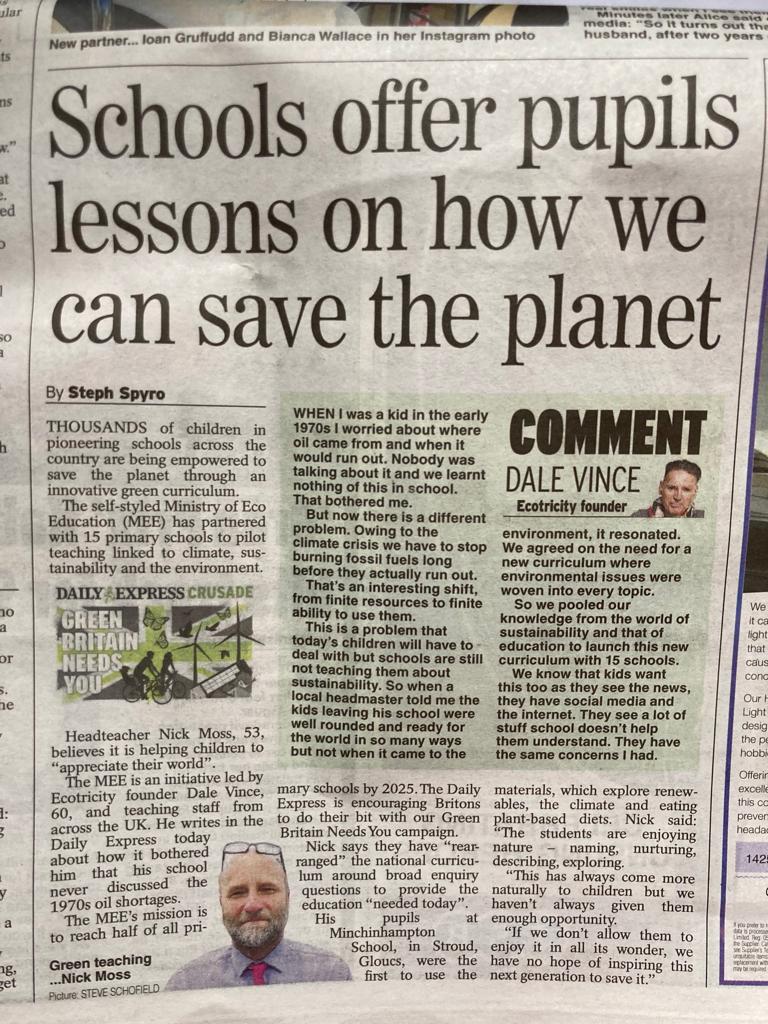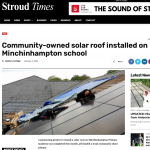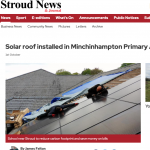Contextual Feature: Concerns for the environment.
Desired Outcome for pupils:
- Pupils who have a deep respect for their immediate environment and the wider world.
- They are environmentally aware; confident to speak their truth and have an unwavering belief that they can make a difference, that they can act to make the world a better place, both in their personal habits and through environmental activism.
- They know their individual impact in terms of what they use and what they leave behind.
- They appreciate the beauty of nature and that solutions to the eco-emergency can be found in nature.
- They understand that the relationship between humans and the earth is central to solving the crisis.
- They appreciate the need for system change and have experienced taking direct action to try to bring about system change.
- They are proud of their participation in several projects driven towards creating a sustainable future but know that their job is far from done.
- They are informed – they know the facts regarding the current climate crisis.
- They appreciate there are 4 main areas we need to tackle to improve sustainability and save the environment:- Energy, Transport, Food, Giving the land back to nature.
- They show a personal commitment to improving these as well as a commitment to reaching out and convincing others.
- They carry the fire.
Partners: Ecotricity, Bath Spa University, Paul Turner- Radical Geographer.
Ministry of Eco Education Website Scoping Report by Paul Turner Ministry of Eco Education zoom meeting August 2021Thank you so much for your help and support with the Ministry of Eco Education!
We’re coming to the end of the 1st academic year with 15 pioneer schools. In September, we’ll launch with more than 100 schools. We’re excited what next year will bring and your plans for using more of the MEE materials.
Paul Turner – June 2022
Eco-curriculum: the progression in thinking skills
Out of the teaching of our eco-curriculum has emerged a hoped for progression in how our pupils think about the environment, this based loosely on a well-established hierarchy of thinking skills called Blooms Taxonomy.
Ministry of Eco Education – 1st Year Impact ReportLayer 1 : knowledge of nature/ likes nature/ knowledge of crisis:
Questions: Tell me what you have learnt about nature.
Tell me some facts you know about the environment.
Do you like the natural world? Do you find it interesting?
Aims for pupils: Experience time spent outside- as a space for learning. Enjoys the natural world; enjoys playing in nature; enjoys using their imagination in nature; enjoys growing things and caring for the natural world
Can name types of plants, trees, birds, animals;can describe local habitats; ;has done some gardening; has learnt aspects of bushcraft.
Responses from some Minch pupils::
‘We did outdoor learning in Reception- and we learnt bush craft. We learned how fun it was to climb trees and how to make dens. It makes you interested in nature; it opens a door to what you are capable of doing. We like going in the woods. On Monday we went to Box Woods. We learned about ecosystems and the constant cycle of something dying and something new growing…….You realise you don’t need manmade things to have fun- nature has it all, all the fun you need. We’re writing a story based on a map we made of the woods…. We saw different types of trees including lots of sycamore and birch. The teachers gave us a lot of classification sheets to help us name and identify trees and creatures. There was some examples of ash buy back – which is sad.’
We love our pond- its full of frogs and toads…I love frogs…
we have the resources- we also have a wild life area behind some willow and now we have a bird hide from where we can observe and name the birds. In Reception we spent loads of time outside. Last year we had chrysalises which grew into butterflies and we set them free on the playground which was an eye- opening experience cos got to see how insects metamorphosize.. We also had chicks and we had rabbits and guinea pigs…
Layer 2: Understands the crisis and why it is a problem
Questions: Tell me some ways in which nature is struggling. What does it mean that there is a climate crisis? Tell me what you have found out about the climate crisis.
Tell me how you feel about the climate crisis. Why should we be worried that there is a climate crisis? Tell me why we need to look after our planet. What have you learned about the impact you have on the environment? Why do you think people have allowed the climate crisis to happen?
Aims for pupils: Has knowledge of the main reasons for the climate crisis. Has knowledge of the main effects of the climate crisis. Explore the issues through stories.
Responses::‘We found at how many hectares are being cut down- and we’re cutting down too much rain forest. We should focus on getting the stuff we need but not all that you want…..The world is getting hotter- imp cos then sea levels will rise – flood the land-
Heard about it in Rec/1- I actually learnt about it in Yr ¾- Antarctica in Rec/1-
This yr studied climate change– did expt to see which melts quickest
….We need space, we like nature….we treasure it – because it might not be the same when we grow up- we want to take on board stuff before it dies out. It was interesting what we found out…it was sad cos we care about the world- I feel like the world…it.makes you feel like you need to stand on top of the world and shout for them to stop.’ ‘If we don’t look after the planet- everything is going to go down hill and we’re going to be sad and there won’t be enough food. Other people in future won’t have same privileges- we don’t want to waste our planet…all our life forms need protecting- stop consuming so much because it’s hurting the planet….we did an experiment about ice melting-
Group response: I never understood it very well but at school we have learnt all about it– we have learnt about plastic pollution and the oceans, about habitat loss and deforestation. We measured weather…
The first piece of plastic was hoped to be a good thing- only one plastic bag but then…
Layer 3: Understands what can be done to avert crisis. Takes some personal responsibility. Understands
Questions: What are the 4 main areas we need to tackle to improve sustainability and save the environment? What do you think will make the biggest difference to the environment? What kinds of things can we do to help the planet?
What are the advantages and disadvantages of different solutions? Do you believe you/we can make a difference? What kinds of thing do you do to make a difference?What different things have you considered doing to help the environment?
What did you feel might be the best way to…. Why did you think this would have the most impact?
Aims for pupils:Has changed habits to help the environment.
Understands how to make a difference with own actions. Knows the main ways in which we can be more sustainable. Engages in deep discussion and learns to question everything. Understands the concept of unintended consequences of our actions. Knows to question information about climate crisis; Understand the various causes of climate crisis and can analyse data regarding causes; Understands impact of different strategies and can make informed comparisons between them. Focus on written work to effect change- eg letters/ posters. Focus on charity work to raise money eg for endangered animals
Responses:
‘I have learnt about our carbon footprint- so I always look at the label on food now. I have learned about the dangers of fast fashion- so I’m going to lend clothes to my brother or donate my clothes. I’m going to stop throwing away clothes. I’ve learnt about how precious nature is so I always pick up plastic and litter. I’ve learnt about the danger of pollution so I’m going to try not to add to it, for example recycle clothes.’
‘I think we can make the biggest difference by cutting less trees cut down/ avoiding fast fashion. I think we need to live more sustainably- for example less waste. I think we should ‘Reuse recycle rethink reduce redo’- we learnt this when doing the fashion show’ ‘It is clearly better to recycle than waste but the government throw recycling into the sea. In school we do recycling….‘Stop cutting down trees and plant more- including in england- not just brazil. Instead of plastic- donlt buy stuff in plastic bags- biodegradable bags. We learned about company called ocean fitness- clothes from recycled plastic from the ocean.’
P4C – Eco Curriculum How to BEE an eco warrior Powerpoint – by Daisy and LucyIn the news, Stroud Times: Solar Roof Installation
In the news, Stroud News and Journal: Solar Roof Installation
Solar Roof Project
Level 4: Convincing others to make a difference
Questions: What kind of things have you done to help save the environment?
Tell me what you have done in school to try to make a difference to the climate crisis.
What have you done to tell other people what you know/ to spread the word?
How do you intend acting in the future to help safeguard the planet?
Aims for pupils: they feel empowered to take action to make a difference. They feel emboldened to speak their truth, to try to persuade others, to make a difference.Focus on project involving pupils being innovative/ inventive. Focus on oral presentation- pupils ‘speaking their truth’. Focus on effecting change in other people’s habits- eg fashion show/ micro-plastics fair. Look to reach a wider and wider audience.
Responses: ‘‘We learned about the oceans- we met a marine biologist and we wrote a letter to supermarkets about reducing their plastic use. We also wrote to Nutella re cutting down trees – and not using palm oil- now we don’t use nutella we use Goo… We wrote letter to supermarket- about them stopping using plastic. We made posters- we were going to go on a march……We did a fashion show and made new outfits out of old. We found out about pollution and how factores are near the sea and wildlife. We think we made a difference- inspire others to reuse old clothes and not buy new all the time. We hoped to influence other children and the parents who came along.
And fast fashion means things constantly thrown away- instead we can rent clothes
WOMAD 2022Y5/6 Sustainable Fashion Geography Project



